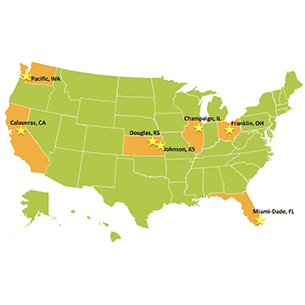
Seven Innovator Counties #StepUp4MentalHealth and Lead Initiative’s Push for Effective Data Collection
 Over the past three years, more than 425 counties across the country have committed to reducing the number of people in jails who have mental illness by signing on to the Stepping Up initiative. Fundamental to that goal is each county’s ability to accurately identify and collect data on people in its jail who have mental illnesses. To ensure counties have the tools to do so, Stepping Up has launched a national effort to help them collect accurate and accessible data on this population.
Over the past three years, more than 425 counties across the country have committed to reducing the number of people in jails who have mental illness by signing on to the Stepping Up initiative. Fundamental to that goal is each county’s ability to accurately identify and collect data on people in its jail who have mental illnesses. To ensure counties have the tools to do so, Stepping Up has launched a national effort to help them collect accurate and accessible data on this population.
As part of this effort, seven counties have been selected as Stepping Up’s inaugural cohort of Innovator Counties, highlighted for their ability to accurately identify people in their jails who have mental illnesses, collect and share data on these individuals to help connect them to treatment and services, and use this information to inform strategic policy and practice decisions. Each of the counties has effectively implemented a recommended three-step approach that includes: (1) establishing a shared definition of serious mental illness for local criminal justice and behavioral health systems’ Stepping Up efforts; (2) ensuring everyone booked into jail is screened for mental illnesses, and those who screen positive are referred to a follow-up clinical assessment; and (3) regularly reporting on this population to stakeholders. Brief summaries of the Innovator Counties’ efforts and progress are included below.
CALAVERAS COUNTY, CALIFORNIA
Population: 44,828
Stepping Up county since March 2016
This rural county in Northern California implemented a validated mental health screening tool in its jail through a partnership between the sheriff’s office, probation department, and the behavioral health department. Every person entering the jail is now screened for symptoms of serious mental illness (SMI) at booking and this information is shared with in-jail clinicians who can match individuals to community behavioral health records or conduct full assessments to confirm the presence of SMI. Once identified, a team of clinicians who work both inside the jail and in the community engage these individuals in treatment and create transition plans to help them continue their path to recovery once released. Calaveras County also participated in a coalition to develop a shared, statewide definition of SMI as an option for behavioral health and criminal justice agencies in California to use as part of their Stepping Up efforts.
CHAMPAIGN COUNTY, ILLINOIS
Population: 201,081
Stepping Up county since June 2015
This county, which encompasses both urban and rural jurisdictions, screens every person booked into its jail for SMI using the Brief Jail Mental Health Screen (BJMHS) and for substance use disorders using the Texas Christian University Drug Screen (TCUDS). People who screen positive for one or both disorders are referred to an on-site clinician who uses motivational interviewing techniques to engage individuals and determine if they meet the criteria for a full assessment, which is conducted by a licensed clinician in the jail or in the community. The Champaign County sheriff and county mental health board also established a process for enrolling eligible individuals in Medicaid in the jail, ensuring they will have access to proper care when they reenter the community.
DOUGLAS COUNTY, KANSAS
Population: 118,053
Stepping Up county since October 2015
In April 2017, the Douglas County Sheriff’s Office (DCSO) integrated the BJMHS into its jail management system (JMS) to better collect and analyze data on people in the jail who have SMI. Every person who comes to the jail is screened for symptoms of SMI using the BJMHS and the results of this screen are stored in the JMS. Those who screen positive are referred to a clinician for a full assessment and potential inclusion in the county’s Assist-Identify-Divert (AID) Program, which provides case management services to eligible individuals who have SMI and helps connect them to community-based services upon release. The JMS also sends an automatic alert about the presence of an individual with SMI to DCSO staff, who can query and analyze data on these individuals. DCSO staff now use this data to more accurately inform the mental health prevalence rate in the jail and track progress on reducing that rate.
FRANKLIN COUNTY, OHIO
Population: 1,163,529
Stepping Up county since May 2015
This Ohio county—which contains the state capital, Columbus—was named an Innovator County due to its implementation of processes to better utilize available data to, among other things, identify the people who use local emergency services and law enforcement resources most often. With this information, the county has been better able to offer comprehensive wraparound services such as benefits connections, workforce services, mental health treatment, and supportive housing to these individuals. Franklin County also played an integral role in working with partners to develop suggested statewide definitions of recidivism and SMI for Ohio counties’ Stepping Up efforts.
JOHNSON COUNTY, KANSAS
Population: 580,159
Stepping Up county since May 2015
The most populous county in Kansas, Johnson County was chosen as an Innovator because of its leadership in collecting and using data to inform policy and practice in the jurisdiction. Johnson County developed its integrated database, the Justice Information Management System (JIMS), in the 1990s to track people as they moved through the local criminal justice system. In 2010, a flag indicating a person’s need for ongoing mental health services upon discharge from jail was added in JIMS, and in 2016, the jail integrated the BJMHS into JIMS and started screening every person booked into the jail for symptoms of SMI. JIMS emails a nightly spreadsheet with the names of everyone booked into the jail to the Johnson County Mental Health Center (MHC) who works to identify existing clients or people who need a clinical assessment. Then, when a person is released from jail, JIMS sends an automated, real-time email to the MHC to begin the outreach process. Johnson County is also investigating ways to more proactively identify and serve people who are at risk of becoming involved in the justice system and to track their efforts to reduce the number of people with mental illnesses in its jail.
MIAMI-DADE COUNTY, FLORIDA
Population: 2,662,874
Stepping Up county since May 2015
Florida’s most populous county, Miami-Dade has been working for more than a decade to reduce the number of people with mental illnesses in its jail, dating back to its establishment of the Eleventh Judicial Circuit of Florida’s Criminal Mental Health Project in 2000. The project diverts people who have SMI and/or co-occurring substance use disorders from the criminal justice system into community-based treatment and support services. In more recent years, the county has developed a shared SMI definition and has jail staff available 24/7 to screen people for symptoms of SMI during the pre-booking process and provide follow-up assessments within two hours for urgent cases (and as soon as possible for others).
PACIFIC COUNTY, WASHINGTON
Population: 20,920
Stepping Up county since December 2015
A rural county on Washington’s coast, Pacific County was chosen as an Innovator due to its comprehensive, system-wide response to people in its local criminal justice system who have mental illnesses. The county, in addition to having a shared SMI definition across its behavioral health and criminal justice systems, has implemented the BJMHS in its jail and collects all the information from the screening tool in an electronic database that can be queried. Pacific County, utilizing money from a state grant along with funds from its 0.1-percent behavioral health sales tax, hired a behavioral health case manager who works closely with the county’s housing case manager on mutual clients to provide permanent supportive housing and wraparound services to eligible individuals. Pacific is also using the grant money to develop a county-wide mental health diversion program.
 Apply Now to Join Stepping Up’s 2023 Set, Measure, Achieve Community of Practice: Leveraging Data to Support Programming, Equity, and Sustainability
Read More
Apply Now to Join Stepping Up’s 2023 Set, Measure, Achieve Community of Practice: Leveraging Data to Support Programming, Equity, and Sustainability
Read More
 New Resource for Counties Seeking to Advance Racial Equity
New Resource for Counties Seeking to Advance Racial Equity
Counties have increasingly prioritized addressing and eliminating inequities in the criminal justice…
Read More













